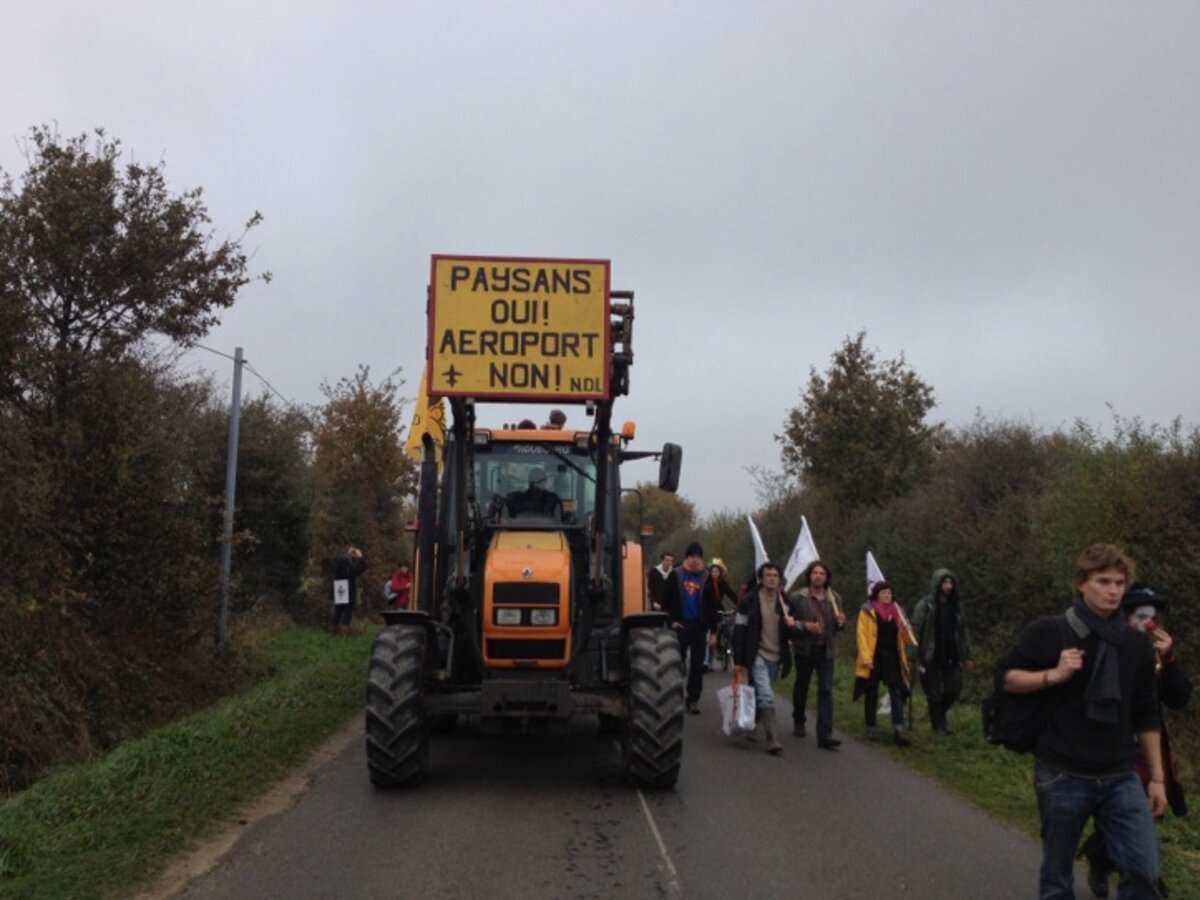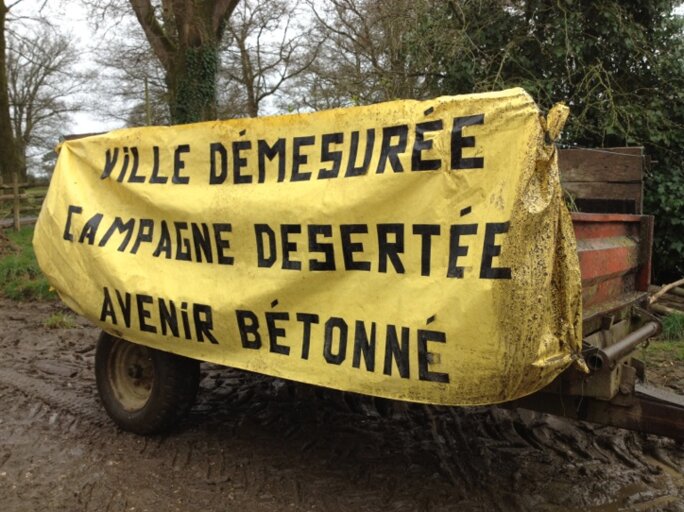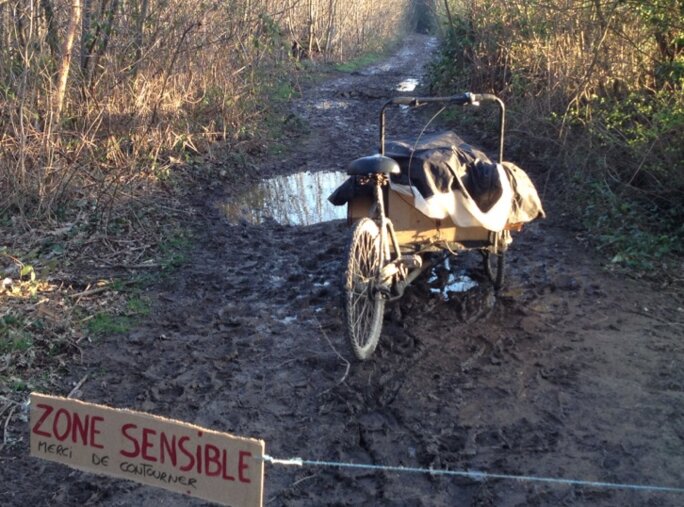Farmers and their families who in some cases have lived for generations on farmland earmarked for the planned new airport near Nantes in western France face legal action to get them evicted from the site. Lawyers acting on behalf of Vinci, the giant construction firm building the controversial airport at Notre-Dame-des-Landes, sought an emergency court ruling at the end of December to get the inhabitants of four farms and three houses expelled from the expropriated land. In addition the group is seeking financial penalties of 200 euros per case for each day of non-compliance. A full hearing before judges at Nantes is scheduled for January 13th.
For the long-standing inhabitants of this future development zone - zone d'aménagement différé or ZAD in French – the latest development comes as a bitter blow. “Our moral's through the floor,” says Dominique Fesneau, co-president of ACIPA, the association that has opposed the airport project for many years. The construction firm had in fact withdrawn their legal action at the start of December, on the eve of the second round of voting in France's regional elections, at which the socialists had made an alliance with the Greens, who are strongly opposed to the airport. But once the elections were over, Vinci did not even wait until 2016 before resuming the procedure. Vinci declined to comment to Mediapart. But at the end of December its spokesperson Jean-François Bernard told Ouest-France newspaper that “we are resuming what the state has announced. We are acting on behalf of the state.”

Enlargement : Illustration 1

Including spouses, children and acquaintances who have a stake in joint ownership of the land, there are around 30 people who face expulsion from the ZAD in all. These are families who owned or rented the land before the airport site was declared a public utility in 2008 and thus subject to expropriation. All have refused to sell their properties to Vinci under the expropriation process that has been continuing over the years in a bid to clear the area so work can begin.
“I don't want to leave, my roots are here, I belong to the fifth generation of Fresneaus who have lived on this farm,” says Sylvain Fresneau, himself a farmer since 1984 who, with three business partners, farms around a hundred dairy cows on the affected zone. A long-standing opponent of the airport scheme, Fresneau says that “my ancestors started their farm when tenant farmers bought their land from the local lord. Today there is another lord: Vinci. To take their money would be like saying 'I'm cashing in and I'm off'.”».

Enlargement : Illustration 2

Marcel Thébault and his wife have lived and worked on a farm in the area since 1999. They come from an area of Brittany just to the north, but could not find a farm in that region to take on. “We visited 22 farms, 19 of which were in the Loire-Atlantique [editor's note, the département or county where Notre-Dame-des-Landes is based]. This one is the 22nd that we visited. We were tired of searching and we liked the surroundings: the hedged farmland, the neighbourhood, the farming conditions. The only downside was this airport project which was languishing in a drawer.” The Thébaults are also dairy farmers and have a herd of 35 cows. And, like the Fresneau family, they do not want to leave. “As farmers we dispute the public usefulness of an airport at Notre-Dame-des-Landes. Here there's farmland, hedged farmland, wet zones and areas that are very interesting from an environmental point of view. The airport project has been put together amid political lies and a disdain for democracy.”
Erwan Lemoigne, a lawyer acting for one of the families threatened with expulsion, disputes the need for urgency from the airport builders, given that they have not adhered to the initial timetable for the project. Initially the new airport was supposed to open at the end of 2018. But the reality is that the formal planning application has still not been filed. Vincent Delabouglise, a local farmer and member of the collective COPAINS, which brings together the local farmers and the environmental protesters against the airport known as 'Zadists', has also pointed out another inconsistency from Vinci. According to him the construction firm is currently renewing the annual agreement it has with farmers who have agreed to the expropriation, under which the latter will be able to continue to cultivate their land this year. These agreements will, logically, run until the end of 2016. “Acting in the name of the government, the group behind the project is starting emergency expulsion procedure, while at the same time it is authorising other farmers to work their lands for a year,” says Delabouglise. “That's certainly a sign that they're not thinking of building straight away.”
'This situation appals us'
In 2012 Marcel Thébault staged a 16-day hunger strike to highlight the expulsion threats that were already hanging over people in the designated construction area. Several other farmers joined in to ensure the hunger strike lasted several weeks. Among these was Michel Tarin, a well-known figure in the local farming community who has since died. The strike took place during the presidential campaign in 2012 and those involved met François Hollande's election team, in particular Stéphane Le Foll, who is today minister for agriculture. After Hollande's election his prime minister Jean-Marc Ayrault, a former MP in the area, made a commitment to place a moratorium on expulsions until all the opponents' legal actions had run their course. In July 2015 the administrative court in Nantes rejected the local residents' appeal against expulsion. The prime minister's office – where Manuel Valls was now in charge - took this to be the end of the moratorium on expulsions. But the airport opponents launched an appeal and they consider that their legal battle is not yet over.

Enlargement : Illustration 3

Supporters of those facing expulsion staged a protest on Saturday, January 9th, on the ring road around Nantes. Organisers say around 20,000 people took part. “We're demonstrating so that the president of the Republic keeps his word and cancels the eviction process as long as all the appeals have not been dealt with,” says Marcel Thébault. Vincent Delabouglise, who is helping to stage the weekend protest, says that “for five years now, since it was declared a project of public utility, we've been asking to meet the government. We have never been able to meet the president of the Republic or his direct advisors. The only response has been to harm the historic inhabitants and the four most emblematical farms, which are known to everyone here. The stakes go well beyond their individual cases. All the farmers are outraged. If they imagine that they are going to break the movement, it will have the reverse effect,” he says. “The anger is going to multiply.”
Meanwhile a group of local Christians from the Nantes diocese are citing the example of the recent Paris climate conference, COP21, and the environment-focussed papal encyclical Laudato Si to petition for the entire project to be re-examined and to stop all eviction proceedings. By the start of last week they had already attracted 150 signatures. “A society is judged – and firstly in the eyes of God – by the place that the poorest, weakest, those who 'don't count', occupy in it,” they write. “Is the plan for the new airport likely to favour this demand for social justice for today's and future generations? There is also the question of the deterioration of the climate from the increase in greenhouse gases generated, and so of climate justice.”
“This situation appals us,” says Arnaud du Crest, one of the petition's signatories. “It is unacceptable to evict the farmers. The land is made to feed people, not to allow aeroplanes to fly.” Michèle Roux, a specialist in agricultural land at the farmers' union the Conféderation Paysanne, says that the farmers expelled from the land at Notre-Dame-des-Landes will in effect become “migrants”. She says: “If they leave they will have nothing left. No more herd, no more profession, no more income. It sickens me.” Roux adds: “You don't find 1,600 hectares of agricultural land, with this hedge structure, hedged farmland, just like that! Farmers are attached to a land, a region, to people. They have their professional network and friends there. All that to build a pointless airport.”
The farmers' union is angry about the contradictions of a government which, on the one hand, supports the '4 per thousand' initiative to store more carbon dioxide in the soil, to compensate for the production of greenhouse gases, yet on the other is ready to destroy hundreds of hectares of farmland and natural sites. The government's response to the issue still seems confused. According to Le Monde, an inter-ministerial meeting took place on Thursday January 7th to discuss the airport project. The prime minister's office said this was a “technical meeting” of a type help regularly on the issue. Meanwhile environment minister Ségolène Royal, who is know to be hostile to the airport plans, declines to accept responsibility for it. “It's a case that is being dealt with directly by the prime minister,” she told Le Monde. “I have given my advice and suggested that we explore alternative solutions. We give lectures on environmental democracy, so let's apply them.” Vinci declined to comment to Mediapart.
----------------------------------------------------------------------------
- The French version of this article can be found here.
English version by Michael Streeter


